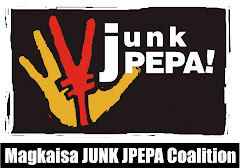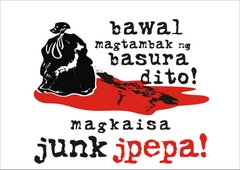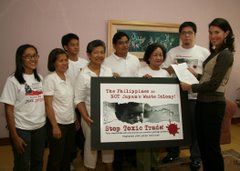JPEPA Side Notes on the Toxic Wastes Issue: Can we now sleep well at night?
Fact, there is no national law or international agreement that demands the inclusion of toxic and nuclear wastes in any country’s schedule of tradable goods. Not even the WTO requires this. There are, however, national and international laws that prohibits the trade of toxic wastes.
Fact, a former DENR secretary opposed the inclusion of toxic wastes in the JPEPA. In the 2003 Working Draft of the JPEPA, toxic wastes were clearly stricken out of the actual page of JPEPA itself.[2]
And yet, these globally repugnant and prohibited wastes nevertheless found their way back into the JPEPA. In previous Senate hearings, the pro-JPEPA government panel resorted to dishonest strategies to mislead the Filipino people. They attributed predictions of JPEPA-created jobs, to authors Cororaton and
In last Thursday’s hearing, September 27, 2007, on environmental issues, the strategy remained fully utilized. The pro-JPEPA government panel adopted this line of reasoning: the
The government panel also waved the banner of their so-called protective side notes issued by the Minister for Foreign Affairs of Japan. Below is an actual snapshot of this side note. It can be downloaded from the official website of the Ministry of Foreign Affairs of Japan: [http://www.mofa.go.jp/policy/economy/fta/philippines.html] – file description: Foreign Ministers’ Letters on the Signing of the JPEPA. This file cannot be found on the website of our own DTI and DFA.

The side notes do not add any new commitments from
The side notes also bear the same commitments that allow
The side notes are not enough. It covers only toxic wastes. What about Ozone Depleting Substances (ODS) such as CFCs, Persistent Organic Pollutants (POPs) such as DDT, Nuclear materials and wastes, which the JPEPA considers tradable goods? At the end of the day, is the diplomatic exchange of notes or side notes enough to defend our environment and our right to health?
Should we Filipinos just hope that
Hope is not a strategy.
JUNK JPEPA!
Ratify the
Enact National Toxic Waste Import Bans!
-------------
Senate Rejection of JPEPA seen. Read here.
Post-hearing report. Read here.
[2] See pages 16-17. Can be downloaded from http://pascn.pids.gov.ph/jpepa/ (lower right hand corner: JPEPA),






No comments:
Post a Comment